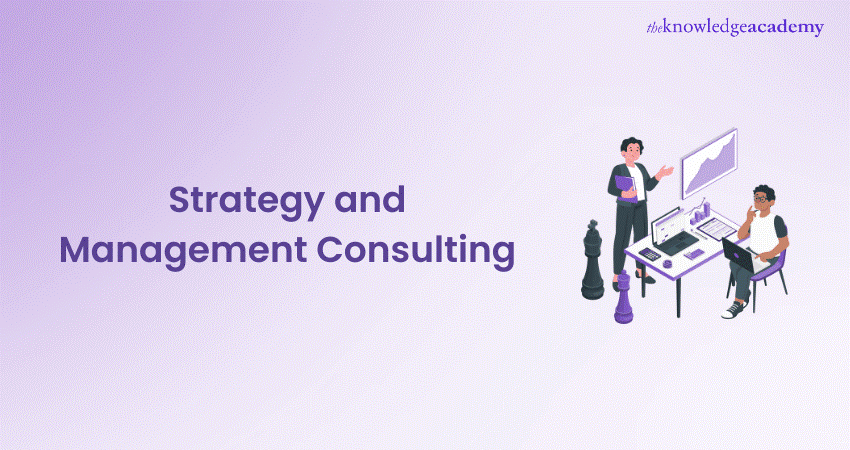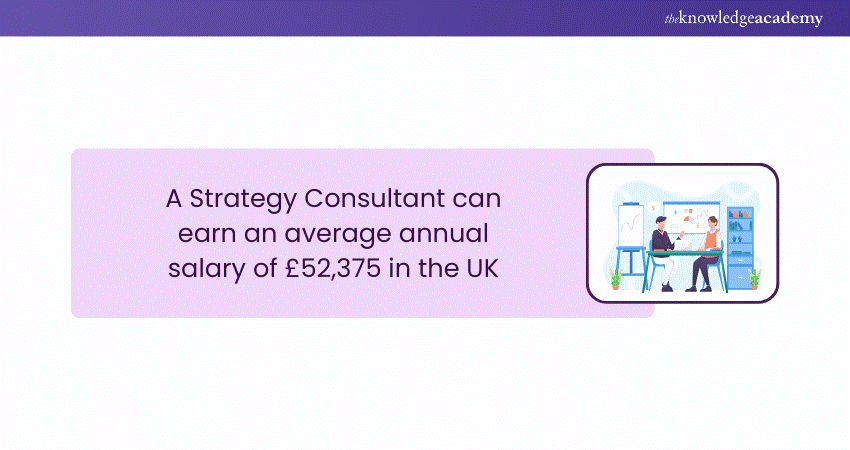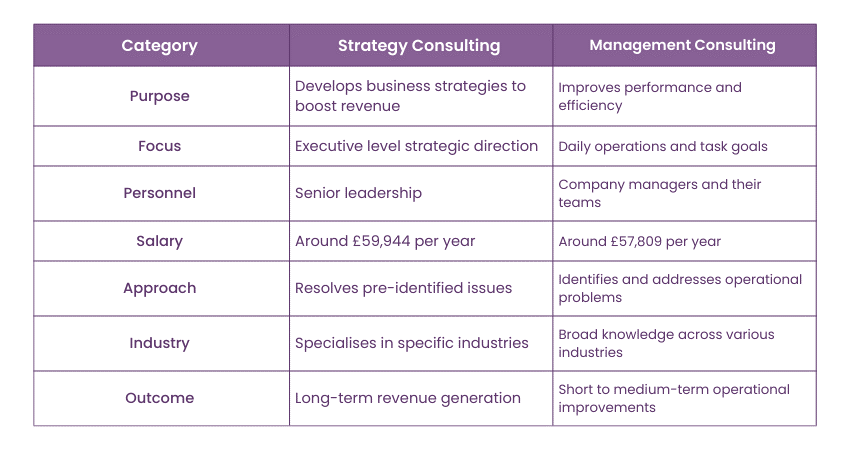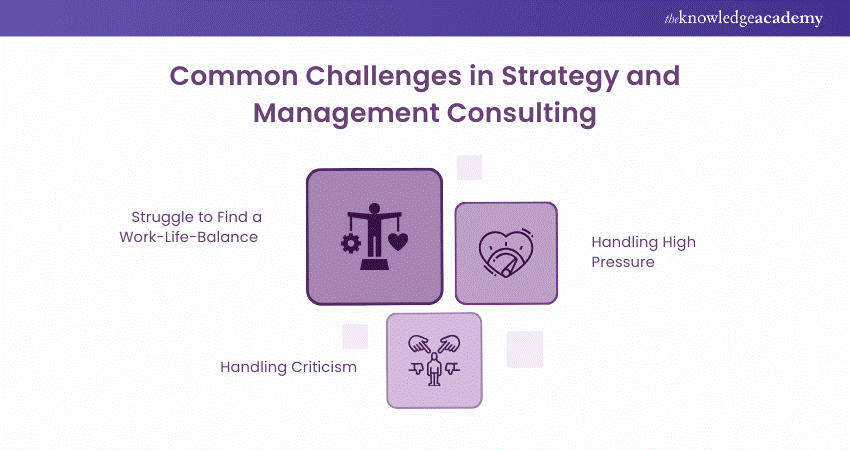We may not have the course you’re looking for. If you enquire or give us a call on +44 1344 203 999 and speak to our training experts, we may still be able to help with your training requirements.
Training Outcomes Within Your Budget!
We ensure quality, budget-alignment, and timely delivery by our expert instructors.

Organisations must continuously adapt to remain competitive in an increasingly complex business environment. Strategy and Management Consulting provides the expertise to help businesses thrive by developing effective strategies for specific goals.
Consultants offer in-depth analysis of your business operations, identifying areas for optimisation and growth. So, use the power of Strategy and Management Consulting to enhance your organisation’s performance and drive sustainable success. Start transforming your business strategy today with expert guidance!
Table of Contents
1) What is Strategy Consulting?
2) What is Management Consulting?
3) Strategy Consulting vs Management Consulting
4) Common Challenges in Strategy and Management Consulting
5) How to Decide If You Want to Be a Management or Strategy Consultant?
6) Conclusion
What is Strategy Consulting?
Strategy Consulting is a form of Management Consulting where company leaders seek external advice to address strategic business challenges. This consulting focuses on high-level corporate strategy to implement changes at the top of the organisation. Strategy Consultants typically:
a) Advise on budget strategies
b) Guide efficient operations techniques
c) Monitor company progress and growth
d) Review company performance
e) Assess company strengths and weaknesses
f) Develop solutions for optimal business strategies

Examples of Projects in Strategy Consulting
Here are some examples of projects a Strategy Consultant might work on:
a) Organisational Design: Creating a new or improved structure for the organisation, including roles, Line Managers, and Directors, to enhance communication.
b) Cost Reduction: Lowering raw material or production costs for a product.
c) New Technology Market Scan: Analysing the market and developing tactics to identify new technologies and competitors.
d) New Business Model Design: Developing innovative strategies to renew the existing business model and restructure the organisation.
e) Pricing Strategy: Creating competitive pricing schemes and models that fit the market.
f) Market Entry: Successfully entering a new market with a new product or service.
g) Growth Strategy: Analysing trends and forecasting to develop business growth strategies, including mergers and acquisitions.
What is Management Consulting?
Management Consulting, also known as operational consulting, involves external consultants helping companies develop management methods, maximise operations, and solve related issues. The goal is to improve overall company performance and efficiency. Management Consultants typically:
a) Analyse management objectives
b) Provide opinions on company performance
c) Assist with project management tasks
d) Advise on performance and management improvement techniques
e) Help implement management methods
f) Review progress after improvements are implemented
Examples of Projects in Management Consulting
Here are some examples of projects a Management Consultant might work on:
a) Technology Transformation: Updating an organisation’s tech systems, including hardware, software, data storage, networks, and information systems.
b) People and Culture Change: Creating a more motivating environment for workers and improving recruitment and appraisal processes.
c) Digital Implementation: Digitising business operations by introducing digital technology.
d) Cloud Migration: Moving all company documents and data from on-site locations to a digital cloud space.
e) Program Management: Overseeing day-to-day operations.
f) Organisational Restructuring: Reworking the hierarchy and chain of command for better communication and effective leadership.
g) Cyber Security Implementation: Enhancing firewalls and online security systems across the company.
Maximise your team's success with our Team Development Training focused on building skills, trust, and cohesive teamwork. Register today!
Strategy Consulting vs Management Consulting
Strategic and Management Consulting are related fields, but they have key differences. Read on to learn more about these differences.

1) Purpose
The purpose of Strategy Consulting is to guide companies in developing and implementing effective business strategies to boost revenue. On the other hand, Management Consulting aims to enhance overall performance and improve workplace efficiency. Both types of consulting seek to make the company better, but through different approaches.
2) Focus
Strategy Consulting focuses on creating efficiencies at the executive level, helping set the company’s strategic direction. This guidance trickles down to lower levels for implementation. In contrast, Management Consulting targets professionals involved in daily operations, directly impacting tasks and goals.
3) Personnel
Both Strategy and Management Consultants are external experts who work closely with internal staff. However, the personnel they collaborate with differ. Strategy Consultants typically work with senior leadership, while Management Consultants collaborate with Company Managers and their teams.
4) Salary
On average, Management Consultants earn more than Strategy Consultants. Strategy Consultants earn about £59,944 per year. At the same time, Strategy Consultants average around £57,809 annually. Salaries can vary based on client base, success rate, and work location.
5) Approach
Strategy Consultants focus on resolving issues the company has already identified, such as refining an expansion plan to increase revenue. Management Consultants, however, identify and address operational problems, like improving project management techniques or collaboration practices.
6) Industry
Strategy Consultants often specialise in specific industries, working with large companies that need targeted expertise, such as expansion strategies in banking. In contrast, Management Consultants have broader knowledge and work across various industries, advising on more general issues, such as hiring processes.
7) Outcome
The outcomes of Strategy Consulting are usually long-term and focused on generating revenue for the entire company. In contrast, Management Consulting produces short to medium-term results, often improving daily operations and employee efficiency. Both ultimately aim to boost company growth and revenue.
Common Challenges in Strategy and Management Consulting
Being a management or Strategy Consultant has many benefits, but it also has its challenges. Let’s look at some of them:

1) Struggle to Find a Work-Life-Balance
Work-life balance is a common challenge in consulting. Long hours, unpredictable schedules, last-minute rushes, and weekend work are all part of the job. However, it’s not all bad. Public opinion can be biased. With good management, you can navigate these challenges with minimal damage.
Finding a consulting job with no personal compromises is tough. Think of it as an active process where you have some control. Consulting is a marathon, not a sprint. Good Managers and partners listen to their teams. If you stick to your principles, you’ll find people with similar values and carve out your niche in the organisation.
2) Handling High Pressure
High pressure and tight deadlines are also challenges for consultants. You’ll need to deliver results within a specific timeframe, which requires high performance. These expectations will be clear, so you should adjust accordingly.
However, it’s important to maintain your mental and physical health. There are ways to manage both, and I’m happy to share tips if you’re interested. The key is not to take things too personally and always prioritise your life.
3) Handling Criticism
Consultants often face criticism from various parties. The main critics are:
a) Client Employees
Many clients view consultants with suspicion and fear. Regardless of the project, some employees worry about losing their jobs, even if the project is about growth and promotions. They may create obstacles and resist cooperation. It’s important to understand that if layoffs are involved, it’s the company’s management that makes those decisions, not the consultants. Consultants advise, but they don’t have decision-making power.
b) Consultant-critical Parties
Some people believe consultants destroy more value than they create, accusing them of wasting clients’ money. They forget that consultants are advisors. The company itself must implement the strategies. No matter how good a strategy is, it won’t work if not implemented properly.
Advance your career with our Management Courses that sharpen your skills and empower you to lead with confidence. Join now!
How to Decide If You Want to Be a Management or Strategy Consultant
Choosing between a career in strategy or Management Consulting depends on your skills, interests, values, and career goals.
1) Skills and Interests
a) Strategy Consulting:
i) Focuses on long-term planning and big-picture thinking.
ii) Ideal for those who enjoy analysing data and making high-level recommendations.
b) Management Consulting:
i) Involves executing specific projects and initiatives.
ii) Suitable for those who like working with teams to implement changes and solve specific problems.
2) Lifestyle and Culture
a) Strategy Consulting:
i) Often requires more travel and longer hours.
b) Management Consulting:
i) Tends to focus more on operational details and hands-on work.
ii) Generally, it involves less travel compared to strategy consulting.
3) Preparation
a) Case Interviews:
i) Crucial for both career paths.
ii) Seek out helpful materials, expert coaching, and opportunities to connect with other candidates.
Conclusion
Strategy and Management Consulting play crucial roles in helping businesses achieve success. However, they both focus on different aspects. Strategy Consulting addresses high-level decisions and long-term growth. Meanwhile, Management Consulting enhances daily operations and improves efficiency. Together, they provide great support to ensure the overall success and competitiveness of the company.
Transform your consulting skills with our Consulting Skills Training. Sign up today and elevate your career with practical skills and hands-on learning.
Frequently Asked Questions

A strategic consultant in the UK earns an average of £57,809 annually, with a range typically between £44,000 - £65,000. Factors like experience, location, and company size can influence this salary.

Management Consultants in the UK earn around £55,544 per year on average, with salaries ranging from £43,000 - £71,000. Pay varies based on experience, location, and firm.

The Knowledge Academy takes global learning to new heights, offering over 30,000 online courses across 490+ locations in 220 countries. This expansive reach ensures accessibility and convenience for learners worldwide.
Alongside our diverse Online Course Catalogue, encompassing 19 major categories, we go the extra mile by providing a plethora of free educational Online Resources like News updates, Blogs, videos, webinars, and interview questions. Tailoring learning experiences further, professionals can maximise value with customisable Course Bundles of TKA.

The Knowledge Academy’s Knowledge Pass, a prepaid voucher, adds another layer of flexibility, allowing course bookings over a 12-month period. Join us on a journey where education knows no bounds.

The Knowledge Academy offers various Management Courses, including Consulting Skills Training, Introduction to Management and Team Development Training. These courses cater to different skill levels, providing comprehensive insights into Types of Data Structures.
Our Business Skills Blogs cover a range of topics related to Management Consulting, offering valuable resources, best practices, and industry insights. Whether you are a beginner or looking to advance your Business Skills, The Knowledge Academy's diverse courses and informative blogs have you covered.
Upcoming Business Skills Resources Batches & Dates
Date
 Consulting Skills Training
Consulting Skills Training
Fri 13th Dec 2024
Fri 7th Feb 2025
Fri 4th Apr 2025
Fri 6th Jun 2025
Fri 8th Aug 2025
Fri 3rd Oct 2025
Fri 5th Dec 2025







 Top Rated Course
Top Rated Course



 If you wish to make any changes to your course, please
If you wish to make any changes to your course, please


